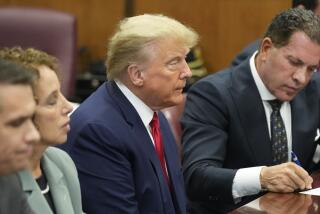Don’t Coddle Terrorists In Court
- Share via
WASHINGTON — President Bush was properly distressed when a draft of the proposed rules for military tribunals was leaked. Clearly, the rules to prosecute suspected terrorists haven’t been completely thought out. Furthermore, if the proposed rules governing tribunal proceedings aren’t further modified, they may undermine the purpose the tribunals were intended to have when the president issued his order creating them--to facilitate the war against terrorism.
So far, it appears the Pentagon is following a restrained course in formulating the rules. Yet some of the proposed regulations are too generous.
There is nothing wrong with the tribunals operating in public to enhance confidence in their outcomes, except when classified information needs to be safeguarded. But there is everything wrong with demanding an evidentiary standard of proof beyond a reasonable doubt. The late Supreme Court Justice William J. Brennan Jr. thought this standard necessary to ensure the liberty of individuals “going about ordinary affairs.” But there is nothing ordinary about the destructive aims of terrorists.
This standard is well-suited for trying a single civilian defendant accused of a crime that can be prosecuted with eyewitness testimony. It makes sense when witnesses are just a subpoena away, when there is routine crime-scene evidence or an abundance of financial or other documentation.
But a standard of proof beyond reasonable doubt is hardly compatible with a proceeding for ferreting out a network of terrorist cells, expeditiously punishing terrorist ring leaders and preventing future attacks. It is especially unsuitable for a trial based on intelligence intercepts and informants who necessarily must operate with less substantiation. Nor does it make sense when witnesses are just as likely to be crossing the Pakistan border as hiding in a cave in Tora Bora.
The historical standard applied in World War II was the pragmatic one of more probable than not, or preponderance. War crimes then were difficult to prove. But surely crimes of terrorism committed by clandestine outlaws worldwide pose a greater difficulty.
The draft tribunal rules do allow the government greater leeway on the admissibility of evidence, and this is prudent. Tribunal proceedings should not be encumbered with the myriad of procedural objections that defense attorneys can raise in civilian courts. The draft’s unanimous-vote requirement for a death sentence is also appropriate, but it should not be uniformly necessary. When imposing lesser penalties, the two-thirds vote originally proposed by the president is better.
While the privilege against self-incrimination should be observed once charges are brought against a suspected terrorist, the tribunal’s final rules should make it clear that any information obtained through noncoercive battlefield interrogation is not similarly protected. Terrorists are not supplied counsel in the trenches. It is simply illogical to think that the absence of an attorney or the privilege against self-incrimination should impede the gathering of information from battlefield detainees. Under international treaty, detainees need not answer beyond revealing name, rank and serial number. Yet, no treaty provides that if additional information is gained in such interrogation it cannot be used in a military trial. The exclusionary rule applicable to police investigations, or even garden-variety court-martials, simply doesn’t fit.
The drafting of the rules that will govern tribunal proceedings continues. As it does, the president must not risk losing the advantage the tribunals can give to the military campaign against terrorism.
*
Douglas W. Kmiec is dean of the Catholic University of America Law School and a senior policy fellow at Pepperdine University.
More to Read
Sign up for Essential California
The most important California stories and recommendations in your inbox every morning.
You may occasionally receive promotional content from the Los Angeles Times.













